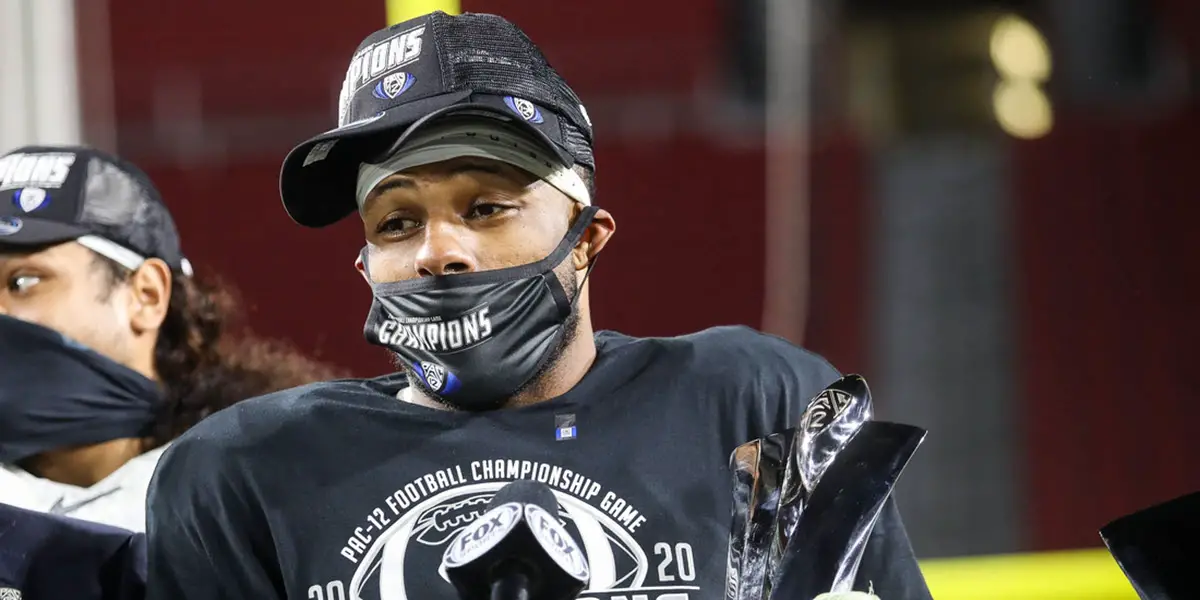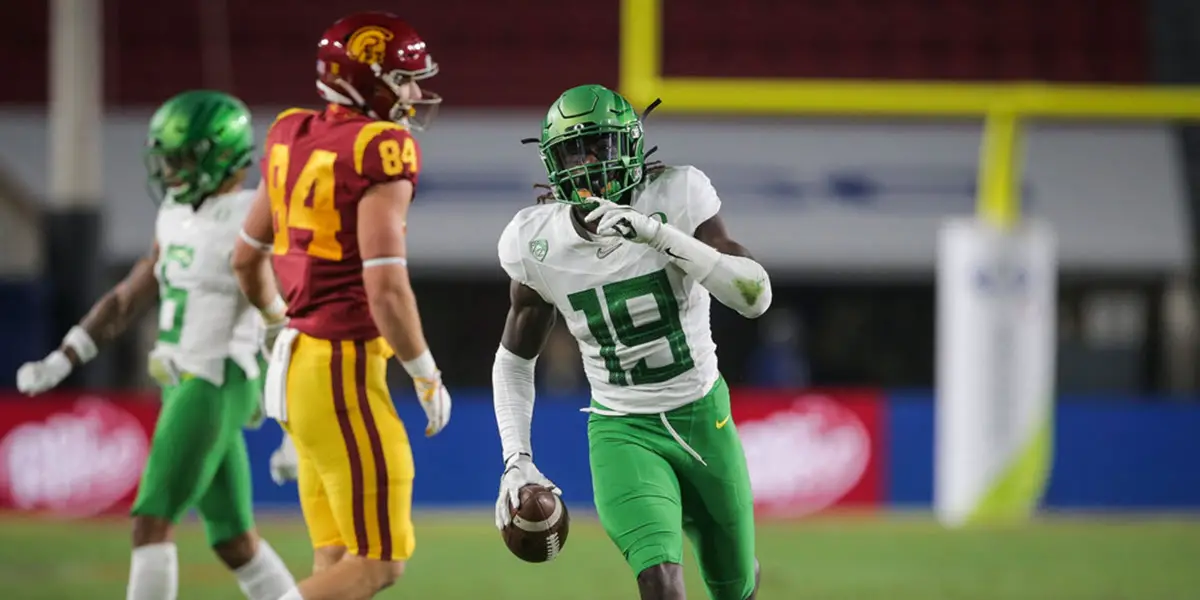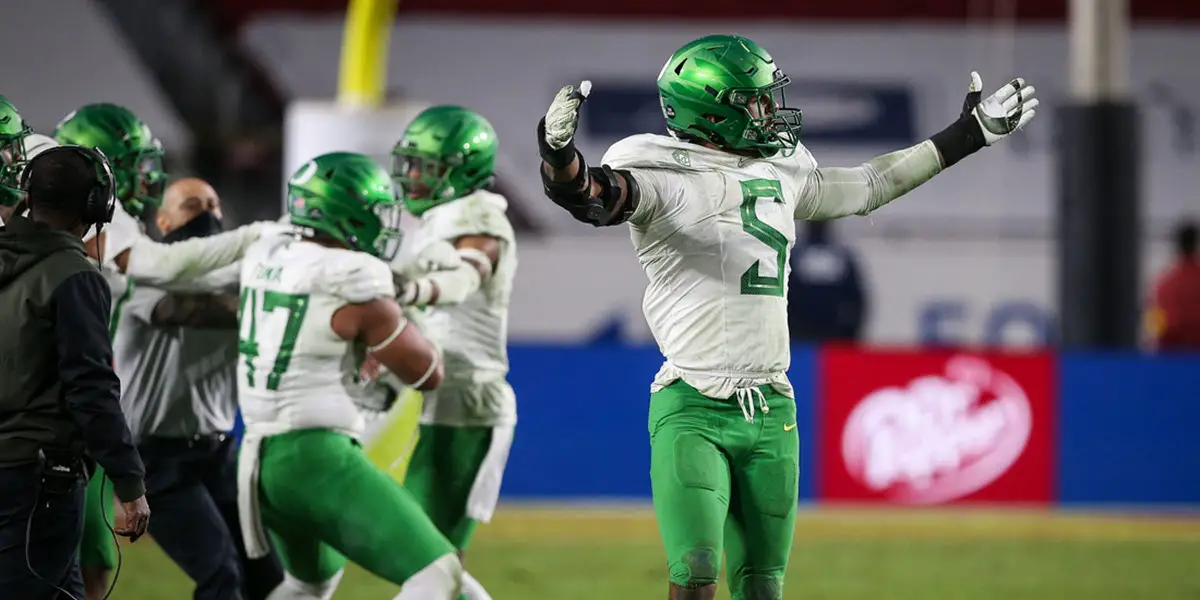This year was marked by an underachieving defense from the outset. However, it is worth reiterating that a great deal of the defense’s underachievement came as the result of Jevon Holland, Brady Breeze and Thomas Graham opting out.
At the end of the season, though, we can say that this is the start of a new era for Oregon’s defense. Mario Cristobal has transformed recruiting at Oregon, and highly rated, blue-chip prospects are becoming the norm and not the exception. At linebacker, Noah Sewell was awarded Pac-12 defensive freshman of the year. Next year, Oregon fans should see a healthy Justin Flowe make an impact on the field.
Another major change that has occurred over the past few weeks has been the emergence of new leaders on defense. This is the quality that binds a team together. It doesn’t matter how many stars Oregon’s recruiters have acquired if there isn’t a cohesive unit playing together on the field.
This new player leadership has had an enormous impact on Oregon’s defensive growth. The Oregon State game was by far Oregon’s worst defensive performance of the year. Oregon was unable to stop both the run and the pass. This was the turning point in Oregon’s defensive season, though. After this loss, defensive players stepped into their roles as leaders and began to hold each other accountable. We saw the results this had on their performance in the Pac-12 Championship Game.
The Old Thibodeaux Is Back

Thibodeaux accepts the MVP trophy at the Pac-12 Championship Game.
The Pac-12 title game was a statement game for Oregon’s defense. We saw Kayvon Thibodeaux return to last year’s form as a destructive wrecking ball on the line. USC had no answer for him, and when they did try to slow him down, another defensive lineman would get through. Kristian Williams and Brandon Dorlus, both underclassmen, put on a show, as they collapsed USC’s offensive line and pressured USC quarterback Kedon Slovis all night.
Retaining Jordon Scott for the 2020 season was a blessing for the Oregon Ducks, as his experience has really allowed the rest of the defensive line to grow. However, these up-and-coming youngsters have bright futures and may become even greater players than Scott.
The defensive line will continue to develop into a force to be feared across the Pac-12 for years to come.
Secondary Finding Its Leaders
The secondary has also taken some major steps forward in the past couple of games. They had a strong second half against Cal and made it difficult for Slovis to find any kind of consistency during the Pac-12 Championship Game. This was especially true when the defensive line forced Slovis out of the pocket.
Oregon’s secondary has looked different with the growth of Jamal Hill, who replaced Holland in the secondary. Hill finished the Pac-12 Championship Game with two interceptions, one of which came at a critical point in the fourth quarter. Both interceptions came as the result of Slovis throwing errant passes while under pressure.

Jamal Hill after his first interception against USC.
However, Hill was in the right position at the right time largely because every other secondary defender was doing their job. Getting the secondary’s assignments in sync has been a major problem all year long for Oregon. Many opposing receivers have been able to get completely wide open. The Pac-12 title game is a testament to the leadership of both Hill and Verone McKinnley, since, in Andy Avalos’ defense, the safeties typically coordinate the secondary.
Yes, USC receivers managed to get open and score points. That should not come as any surprise given that Slovis is a good quarterback running a pass-heavy system and throwing to an incredibly talented receiving corps.
Playing as a Unit
Thibodeaux was awarded the Pac-12 Championship’s Most Valuable Player award, though that was only possible because the rest of the team contained the run, forced the USC offensive line to account for multiple playmakers, and covered well in the secondary. As a result, Thibodeaux had more one-on-one match-ups and more time to get pressure on the quarterback.
Defense truly lives and dies as a unit.
The 2020 defense will have one final test this season when they take on Iowa State in the Fiesta Bowl. But more importantly, Oregon has found its leaders, who will play a key role in the off-season. Players will hold each other accountable when it comes to maintaining their training regimens without coaching oversight.
The Cristobal Era is in full swing, and we all know the potential of this defensive squad. Now, can they live up to that potential?
David Marsh
Portland, Oregon
Top Photo By: University of Oregon Athletics
Let’s discuss this article and the points-to-ponder in a post on the Our Beloved Ducks Forum right here.
 Andrew Mueller, the FishDuck.com Volunteer Editor for this article, works in higher education in Chicago, Illinois.
Andrew Mueller, the FishDuck.com Volunteer Editor for this article, works in higher education in Chicago, Illinois.

David Marsh is a high school social studies teacher in Portland, Oregon. As a teacher he is known for telling puns to his students who sometimes laugh out of sympathy, and being both eccentric about history and the Ducks.
David graduated from the University of Oregon in 2012 with Majors in: Medieval Studies, Religious Studies, and Geography. David began following Ducks Football after being in a car accident in 2012; finding football something new and exciting to learn about during this difficult time in his life. Now, he cannot see life without Oregon football.

